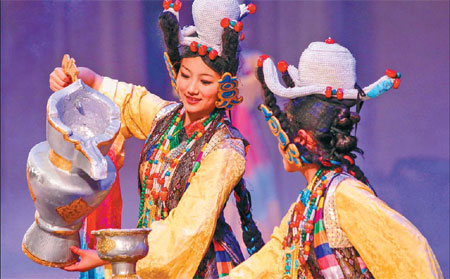

 |
|
Women in traditional Tibetan costumes perform folk dances during the opening ceremony for the Tibetan Culture Week in Warsaw, Poland, on Monday. Zhou Lei / Xinhua |
Tibetan Culture Week in Warsaw, Poland, is offering Polish people a glimpse into the Tibet autonomous region's rich culture and art and helping to deepen Polish understanding of Tibet and China-Poland relations, said officials and scholars from both countries.
Opened on Monday, the week-long cultural event is the first of its kind held in Poland and features photography and Tangkar, a type of Tibetan scroll painting, exhibitions, a gala of Tibetan folk songs and dances, and academic exchanges between Tibetan and Polish scholars.
In a letter addressed to the event, Jia Qinglin, chairman of the National Committee of the Chinese People's Political Consultative Conference, called the event a key part of the cultural exchanges between China and Poland.
"Through these vivid exhibitions and performances, we hope to present to Polish people the cultural, economic, social and political achievements Tibet has made over the past several decades," said Cui Yuying, deputy director of the Information Office of the State Council.
"The event will further bring the two civilizations closer and provide a platform for heart-to-heart dialogue and exchanges between Chinese and Polish people," she said.
The photography and Tangkar exhibitions present more than 200 works by well-known Chinese and foreign photographers as well as more than 40 Tangkar paintings by Tibetan artists.
"For me, this is a great discovery of the beautiful art of Tangkar, which is very colorful, exotic and original," said Longin Pastusiak, Poland's former speaker of the Senate.
"Although the average Polish person's knowledge about Tibet remains limited, there is a growing interest. The exhibition really helps improve the Polish understanding of Tibet's history, modern development and the future," he said.
Sylwester Szafarz, former deputy ambassador of Poland to China, said the cultural event will have a significant impact on Polish society as well as on Poland-China relations.
"It is a significant step in the right direction and should be a continuous process with more two-way exchanges particularly between the younger generations," he said. "That's why I am convinced that such a cultural week here in Poland will have a big impact."
Sino-Poland relations have been developing fast, but suffered a setback when then French president Nicolas Sarkozy met the Dalai Lama in Poland in 2008.
Last year, the leaders of the two countries decided to elevate Sino-Poland relations to the level of strategic partnership and to build a strategic dialogue mechanism among vice-foreign ministers of the two countries to exchange views on international and regional affairs of common concern.
"A better understanding of Tibet will have a very positive effect on the development of the Sino-Poland strategic partnership," said Xu Jian, Chinese ambassador to Poland.
Wieslaw Klimczak, chairman of Poland's civil association Polish House, said it is important to strengthen both official dialogue and communication between the two countries.
"Very often we hear Tibet spoken about in Poland by people who do not truly know and understand Tibet," he said. "So it is important for us to establish ties with Tibetan civil organizations and to strengthen people-to-people contacts."
Lhakpa Tseten, deputy dean at the School of Humanities at Tibet University, who participated in the academic exchanges with Polish scholars, said that he hoped to have more Polish students enrolled in the university to study the Tibetan language, history and culture.
"The Polish people's knowledge about Tibet is actually more than I initially thought. They are expressing great interest in our religious beliefs, traditional Tibetan culture and the recent economic development," he said.
Tibet University started to enroll foreign students in 1993, and more than 1500 students have studied and graduated from the university since then, according to Lhakpa Tseten.